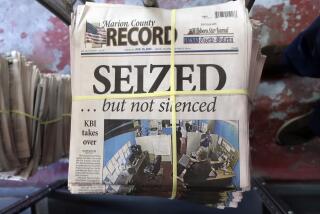FBI Studies 2 More Laws in Computer Virus Case
- Share via
WASHINGTON — FBI Director William S. Sessions on Thursday added two more laws to those agents are checking to determine whether charges should be sought against Robert T. Morris Jr. for unleashing a computer virus that shut down or slowed computers across the nation last week.
One of the laws--malicious mischief involving government communication lines, stations or systems--appears not to require the government to prove criminal intent, a requirement that attorneys have described as a possible barrier to successful prosecution in the case.
Sessions told a press conference at FBI headquarters that the preliminary phase of the investigation should be completed in two weeks and defended the pace of the inquiry, in which Morris, a Cornell University graduate student, has not yet been interviewed.
Programming Error Cited
Friends of the 23-year-old Morris have said he told them that he created the virus but that he unintentionally caused it to replicate itself rapidly in computer systems throughout the nation because of a programming error.
Sessions, who avoided using Morris’ name while fielding several questions on the case, said: “There has to be a very careful and deliberate look at it before I would ever go out and suggest that a person had actually committed a crime. You have to move carefully, and I think we’ve done it in this case.”
Other sources have said FBI agents have not sought to question Morris because they want to wait until they obtain the detailed electronic records of the programming he used in setting loose the virus--records that have been maintained under seal at Cornell University.
Investigators are known to be eager to examine the program Morris created, believing that it could constitute the best evidence, even as to the question of intent, in the case.
Thomas A. Guidoboni, Morris’ lawyer, has declined to state whether he would make his client available for an FBI interview.
In addition to the malicious mischief statute, which carries a maximum penalty of 10 years in prison, Sessions listed fraud by wire as one of the laws being considered for possible application in the case. It provides for imprisonment of as much as five years.
On the intent question, Sessions defined it as “knowing an intentional doing of an act which the law forbids and knowing that the law forbids it to be done.”
Apparently referring to the malicious mischief law, Sessions said: “We also have other statutes which deal simply with knowingly doing something.”
On another matter, involving his tenure, Sessions said in response to a question that he would not be submitting his resignation to President-elect Bush. Although noting that he serves at the will of the President, Sessions cited a 1976 law that Congress passed setting a 10-year term for the FBI director. He has been director for a little more than a year.
The 10-year-term law was enacted primarily to prevent a recurrence of the long tenure of J. Edgar Hoover, who commanded the FBI for nearly 50 years before he died in 1972.
In a report on the legislation, the Senate Judiciary Committee said it did not intend to limit a President’s formal power to remove an FBI director who served fewer than 10 years but added: “The President and the attorney general would be expected to justify the midterm removal of the FBI director on (significant policy) grounds and not merely for the reason that a new President desires his ‘own man.’ ”
More to Read
Sign up for Essential California
The most important California stories and recommendations in your inbox every morning.
You may occasionally receive promotional content from the Los Angeles Times.










